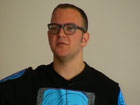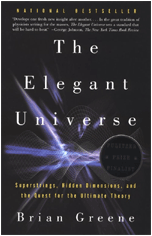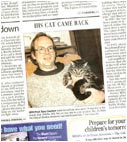The front page of CNN.com often seems to be as hilarious and absurd as the front page of The Onion. My friend Dan James point today’s particularly notable list of “top stories” (see the full screenshot):
Philosophy & Sophistry
Video of Reboot conference presentations
 Video of the presentations from the Reboot technology conference in Denmark is available for download. Presenters include Jason Fried (37signals and Signal vs. Noise) on contingency design and Cory Doctorow (author of Down and Out in the Magic Kingdom) on digital rights management and copyright (a good talk – worth watching).
Video of the presentations from the Reboot technology conference in Denmark is available for download. Presenters include Jason Fried (37signals and Signal vs. Noise) on contingency design and Cory Doctorow (author of Down and Out in the Magic Kingdom) on digital rights management and copyright (a good talk – worth watching).
The Genius Box: quality educational streaming video
During my recent spell as a Mac-user, a friend pointed me to an interesting talk by Apple’s VP of Software Technology and all-around Unix-guy, Bud Tribble. The talk was great, both in terms of content (the speaker was interesting) and delivery (the streaming media was smooth and of sufficient quality).
This video is one of many available online by University of Washington Television. Many of the videos consist of lectures by professors, guests from industry, or other special university events. This is a fantastic use of the medium. I’ve been soaking in the talks on politics and interaction design. I commend the University of Washington for this significant contribution to the public good.
A few recommended starting points (most are about an hour long):
- The CSE Colloquia 2003 and CSE Colloquia 2002, including:
- Mac OS X for UNIX Users with Apple’s Bud Tribble
- The Google Linux Cluster with Google Fellow Urs Hölzle
- Amazon.com: Differentiating with Technology with Amazon.com CEO Jeff Bezos (that laugh – wow)
- Free Speech, Dissent and Citizen Participation with Ralph Nader
The entire collection can be browsed by series or by title. Basic requirements: Windows Media player and a decent high-speed internet connection (works well on my DSL). Add a reply to this post if you find any particularly good talks.
I suspect the way in which the internet has been stealing time from television in my life is representative of a lot of web users. However, the passivity of television is sometimes the whole point. For example, when you can’t sleep or need to wind down before going to sleep after a busy day, sitting and watching something (as opposed to reading/writing) can sometimes be just what you need. After all, who doesn’t find a PhD presentation on interaction design relaxing?
With the continuous improvements in quality and reliability of streaming media, portable computers, and wireless networking, great content like this will soon become widely accessible. As software and hardware becomes cheaper, I can imagine universities eventually making video of most lectures available online for reference.
Learning about the creative commons
I haven’t felt that I’ve known enough about copyright and patents to have a clear position on the related issues. I have ordered Laurence Lessig’s book, The Future of Ideas, in order to learn more about the issue.
 In anticipation of reading the book, I watched/listened to Lessig’s keynote presentation from this year’s O’Reilly Open Source Convention. It is an excellent presentation.
In anticipation of reading the book, I watched/listened to Lessig’s keynote presentation from this year’s O’Reilly Open Source Convention. It is an excellent presentation.
First, the content of the speech is compelling and powerful. However, I was also struck by the effectiveness of simple visual aids. The presentation is mostly text-based; white text on a black background with occasional selective use of color (only red).
I’ve written, vaguely, about my fascination with the concept that we are, technologically and culturally, standing on the shoulders of giants. When I post to this site, as a simple example, I don’t have think about pixels and packets – someone else has done that for me. This concept that human achievements will continue to improve, which could almost be described as the religion of the western world, relies on our ability and freedom to build on the achievements of others. Lessig’s speech points out how this is threatened by copyright and patent law. More on this as it reveals itself to me.
I strongly urge you to watch/listen to Lessig’s keynote. It is about a half-hour long and is available in Flash, with the visuals of the presentation as well as the audio, or as a standalone MP3 (obviously audio only). Take a half hour and listen to it – not while you work – get comfortable and pay attention. It’s worth it. Don’t bother replying unless you’ve actually taken the time to hear the entirety of the speech.
when I grow up I’m gonna be a physicist

While aov rages with debate about web standards and development techniques, a regular reader speaks up for those who aren’t enthralled by cascading style sheets and asks us to throw them a conversational bone. Fair enough, how’s general relativity for a Sunday conversation topic?
Brian Greene’s The Elegant Universe is an introduction to string theory, the latest stepping stone in the scientific quest for the ‘unified theory of everything’. The book is intended for a general audience without an academic background in physics (that describes me pretty well – Physics 101 was at 8:30AM and my hair was always frozen from a quick shower and cold walk to the campus).
Greene’s book has been worth the price if only for the simple and graceful explanation of Einstein’s Theory of General Relativity in the first few chapters. Taking the leaps from Newton to Einstein as if they were steps in a walk through the garden, Greene’s gives a sort of history of modern physics for dummies. His ability to simplify and explain the abstract concepts of relativity remind me of how C.S. Lewis can simplify theology without sacrificing the integrity of the topic.
I remember torturing my high school physics teacher when learning about the laws of gravity. ‘What is gravity?’ I would ask. The answer would come straight from the textbook: ‘Gravity is the attraction between any two massive bodies, which is directly proportional to the…’
Of course, this is a descriptive definition. ‘Yeah, I know what it does, what what is it?’. I was genuinely curious, though my primary motivation was to illustrate that the teacher didn’t know – nobody knew.
Looking back, I give my teacher credit for not screaming that gravity was the warping of space-time but my puny 16-year-old brain was incapable of grasping the concept. She was a good teacher. Conceeding to our weak collective attention span, she read to us from a book called Einstein’s Dreams.
I feel, having begun The Elegant Universe, that I’m getting the answer to questions like ‘what is gravity?’ as well as they can be answered by modern physics to someone with no academic background.
Greene’s steers clear of the arrogance (however justified) of Stephen Hawking’s A Brief History of Time. Hawking’s writing leaves the reader feeling as though the author had to be persuaded by editors that it was worth writing for the average reader. Greene seems to relish in the potential of the much broader impact of simple and accessible writing.
Most fascinating of the many revelations in these first few chapters is the compounding of human achievement. Einstein found out what was wrong with Newton’s ideas (a profound discovery, of course) just as today’s physicists are trying to find out what’s wrong with Einstein’s ideas.
I am constantly amazed by this compounding effect of scientific and technological progress. In 1997, our beautiful Island province was connected to the rest of Canada with the construction of the 12.9Km Confederation Bridge. Every time I drive across the bridge, I marvel at how anyone was able to build such a fantastic structure.
I was wondering about this aloud at work one day (as I often do) and a co-worker drew an apt analogy to our work with software.
Each individual engineer and construction worker did their part, building upon each other’s work and expertise. The person who drives the crane (there was a very cool crane involved) doesn’t have to understand the effects of cold on the strength of concrete. The person who paints the lines doesn’t have to understand the aerodynamics of the structure in high winds.
Progress in software works in a similar way. When I call on a simple PHP function to show the date on a website, I don’t need to understand how PHP is interpreted. I don’t need to understand the network protocols used to transmit the process page to your computer. Basically, I don’t need to understand how computers work because someone else has done it for me.
All of this nonsense brought to mind the recently asked question: Is evolution finally over?. Could it be that this growing external knowledge base (as opposed to being stored in the memory of individual human beings) is the new evolution?
Today’s average civil engineer isn’t any smarter than a scribe of 3000 years ago. The difference is that the civil engineer has Newtonian physics and centuries of progress in chemistry at his disposal.
Futuretastic guru Ray Kurzweil has drawn this parallel between natural evolution and the progress of technology. He proposes that evolution and eventually technological progress fall on the same grand timeline. He goes so far as to suggest that this scale of progress, both natural and technological, has been accelerating according to an expanded version of Moore’s Law.
We are not standing on the shoulders of giants. Rather, we are standing on the shoulders of millions of average people.
words and phrases due for retirement
It is usually a good practice to have your house in order before start shitting on your neighbours, lest you be shit upon yourself (I know there are more appropriate analogies, but they all seem so cliché). Criticizing writing can be a dangerous thing to do. If you do so and make a typo (something I may well be doing right now) then you look like an idiot. As haste and sloth often trump good editing in my writings here on aov, I am in no position to criticize. However, if we all just stood around waiting for someone without sin, some much needed stones would go un-thrown.
What follows is a collection of words and phrases that, after noticing how dumb they make people sound, I am striving to avoid using myself:
- “First and foremost” – Often used by public speakers, primarily politicians, looking to create an artificial depth and emphasis. Although the alliteration is awfully alluring, this phrase has been robbed of any meaning it may have originally had.
- “At this time” – Often used by amateur public speakers, this phrase is oddly prevalent in Church settings (“I’d like to call on the choir at this time”). I suspect that there are people who use this term while speaking in church but never in any other setting. This has always confounded me. If you remove the phrase ‘at this time’ from your sentence, it is no less meaningful.
- “If you will” & “per se” – No, thank you. I will not.
- “Nothing but respect” – I have nothing but contempt for people who usually use this term to artificially sweeten their sour criticism.
- “Utilize” – See “use“.
For a more intelligent and less derivative position on clear writing see George Orwell’s article Politics and the English Language where he declares that “The great enemy of clear language is insincerity.”
War, War, & Hockey
This is what I found on the front page of the CBC website today.
Note the earth-shatteringly improtant three main headlines. Everything they say about Canadians is true.
“The great enemy of clear language is insincerity.”
George Orwell is cool. 1984 and Animal Farm are staples of the high-school English class. If you read them in high-school, reread them. If not, read them. I was directed to an article Orwell wrote which feels like a hopeful obituary for the English language.
If you do any writing, professionally or personally, you must read Politics and the English Language. I wonder how his comments pertain to web-log writing where there is little editing and the tone tends towards speech. However, anyone writing in any medium should benefit from these ideas.
A few highlights from George Orwell’s Politics and the English Language:
“If you simplify your English, […] when you make a stupid remark its stupidity will be obvious, even to yourself.”
“Words like phenomenon, element, individual (as noun), objective, categorical, effective, virtual, basic, primary, promote, constitute, exhibit, exploit, utilize, eliminate, liquidate, are used to dress up simple statements and give an air of scientific impartiality to biased judgments.”
“The great enemy of clear language is insincerity. When there is a gap between one’s real and one’s declared aims, one turns as it were instinctively to long words and exhausted idioms, like a cuttlefish squirting out ink.”
“What is above all needed is to let the meaning choose the word, and not the other way about.”
a tale of cats, philosophers, and SUVs
aov’s favourite philosophy professor, Tony Couture, to whom we owe a lot of our genius, has had quite a misadventure.
As featured in The Guardian newspaper, Tony’s unreasonably large Sport Utility Vehicle went off the road near Shediac. While Tony seems to have escaped unscathed, the windows smashed and his cat, Casi, went missing. After 18 days lost in the woods a few good Samaritans tracked down the cat and he was delivered home safely.
Tony, we’re glad to hear you are ok and that Casi made it home safely.
After my earlier post about how the news is never pertinent to me, this is refreshing.
tonight: the real debate
Tonight at 8:00PM EST on CBC Newsworld, home of Canada’s best TV show, Counterspin, be sure and tune into the Alternative Election Debate.
Five of Canada’s ‘other’ parties will be debating the issues (I get the feeling the “issues” might be somewhat different than the “issues” we are used to hearing about at election time).
The debate will include representation from for following parties:
- Communist Party of Canada
- Marxist-Leninist Party of Canada
- Canadian Action Party
- Green Party of Canada
- Christian Heritage Party of Canada
- The Marijuana Party of Canada (!!)
- The Natural Law Party of Canada
The debate will be broadcast live on the web at 8:00 PM EST at both the CBC Election 2000 site and at The DemocracyChannel.net.


